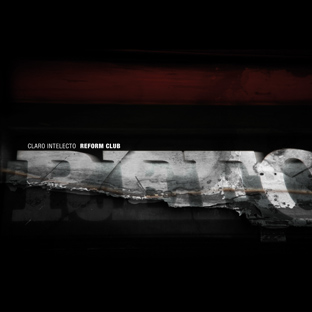Claro Intelecto’s fantastic “Second Blood” released in January prepped the stage for the English producer’s jump from the Modern Love of old to its newer, darker, amphetamine-fed template. Mark Stewart let his beats droop down into the groggy 90 BPM range of Andy Stott and D.H. and strangled hazy dub chords between monster bass textures. But two things set the track apart: 1) “Second Blood” was released on Delsin, which, with recent releases like last year’s Escapism from Conforce, made a good amount of sense, and 2) the track, while inky black, oozed with melody and quieted, noir-ish beauty. Stewart cemented himself as a definitive Modern Love stalwart with the excellent 2006 – 2009 Warehouse Sessions series, but has since remained quiet. His new LP, Reform Club, sees the producer return, aiming for a shadow-lined dance floor with hand on heart.
“Second Blood, while making an appearance late in the album, turns out to be a bit of a red herring. At least in how quickly it draws comparisons to Stott. Most of Reform Club hovers above the 100 BPM mark, but Stewart still feeds everything through a great deal of sidechain compression and flogs it with thickly sinewed bass grooves. Textures run from intricate plinking, percussive dub pulses to glacial, metamorphic synth melodies. Opener, “Reformed” clings to a quickly exhaled, watery string sample and double-dutches with an infectious ricocheting 4/4 snare. Despite the record’s severe tone, Stewart finds an FM-radio playfulness that has been cropping up in UK techno over the past couple years due its proximity to bass music. Though you do still get the zero frills, machine-rumble squelch dub of cuts like “Blind Side” and “Night of the Maniac”.
Reform Club‘s ultimate driver is its exploration of subtle atmospheric beauty. Tracks like “It’s Getting Late”, galloping headlong along a cloudy bed of nocturnal synths feeling out the track with beautifully understated shifts in melody while a glut of percussion winds and spirals, or “Striptease”, its piano samples elongated into melting tendrils of melody, rattling field-recording percussion filling the space between the steady kick, or “Control”, it’s strings erupting in staggered bursts like a chopped up Gas while clicking garage poly-rythms patter outward – all settle on a tone that’s dark and beautiful but all somehow find themselves standing well apart from a figurative institution of techno readily described as dark and beautiful. “Still Here” reminds me of Pantha Du Prince’s painfully gorgeous string-laden “Saturn Strobe”, which works well in extremes – tearfully sad yet upliftingly beautiful, operatic yet understated (not to mention all the tinkling percussion flourishes). The album’s sharpened tonal intricacies help shape Claro Intelecto’s voice into one that’s refreshingly individual – unafraid to step out from behind emotional ambiguity while still exploring its depths and boundaries.
Regarding my own personal tastes, dub techno is probably the most interesting thing in dance music right now. Its sounds and trends are being passed around daily, it has an earnest vitality and human attitude, and an allusive, precarious “cool” factor surrounds the genre that seemed to follow bass music’s effect on its way in. But an album like Reform Club stands at the top of the heap. Its one of those records in any scene with a constantly cresting wave that typifies the scene in its abstractions, but then transcends it without a fuss. It’s an album that continues to unpack itself after half a dozen listens – as beautiful as it is detailed. A triumphant return for one of UK techno’s most assured producers.

